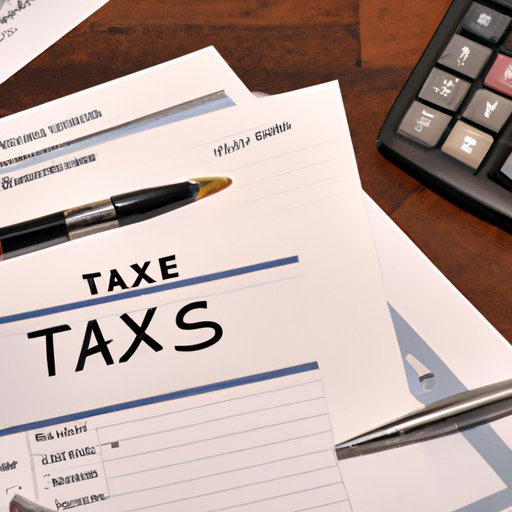
Introduction
Forgetting to file your taxes can have serious repercussions, both financially and legally. However, there is hope for taxpayers who find themselves in this situation. In this article, we will explore the consequences of missing tax filing deadlines, provide solutions for minimizing penalties, and offer tips for staying on top of your tax preparation throughout the year.
Consequences of Forgetting to File Taxes
It is essential to prioritize filing your taxes on time because failing to do so can result in penalties and interest accruing over time. According to the IRS, there is a failure-to-file penalty of 5% of your unpaid taxes for every month or part of a month that your return is late, up to a maximum of 25% of your total unpaid taxes.
In addition to penalties and interest, taxpayers who fail to file their taxes on time may also experience difficulty obtaining loans or credit, have their wages garnished, or have liens placed on their property.
Statistics show that millions of taxpayers fail to file their taxes each year, resulting in millions of dollars in unpaid taxes and penalties. In 2018 alone, the IRS assessed over $30 billion in penalties for late or non-filed tax returns.
Can You Go to Jail for Not Filing Your Taxes?
While it is rare for taxpayers to be sent to jail for failing to file their taxes, it is possible. The legal ramifications of missed filing deadlines can include both civil and criminal penalties. For example, if the IRS determines that you have willfully failed to file your taxes, you could face criminal charges for tax evasion.
In high-profile cases, individuals who have failed to file their taxes have been sent to jail. One famous example is Wesley Snipes, who was convicted of three misdemeanor counts of willful failure to file his tax returns and served three years in prison.
The Financial Impact of Forgetting to File Your Taxes
The financial impact of forgetting to file your taxes can be significant, especially if you have a high income or owe a substantial amount of taxes. The amount of penalties and interest that accrue over time can quickly add up, making it even more challenging to catch up.
The IRS determines penalties and interest based on a formula that takes into account how late your tax return is and how much you owe in taxes. For example, the failure-to-file penalty is 5% of your unpaid taxes for every month or part of a month that your return is late, while the failure-to-pay penalty is 0.5% of your unpaid taxes per month.
To put this in perspective, suppose you owe $5,000 in taxes and fail to file your return for six months. The total penalties and interest would be approximately $1,250, on top of the original $5,000 owed.
Steps to Take If You Realize You Missed the Tax Filing Deadline
If you realize that you missed the tax filing deadline, don’t panic. There are steps you can take to minimize penalties and get back on track. The first thing you should do is file your tax return as soon as possible. The longer you wait, the more penalties and interest will accrue.
Next, consider paying your taxes as soon as possible, even if you can’t pay the full amount owed. The IRS offers payment plans and options for taxpayers who cannot pay their full tax bill at once. By paying what you can, you can avoid additional penalties and interest.
Finally, be sure to keep track of all correspondence you receive from the IRS and respond promptly. Ignoring letters and notices from the IRS will only make the situation worse.
The Psychological Effects of Tax Avoidance
For many taxpayers, procrastination and avoidance can make filing their taxes even more stressful. However, there are strategies you can use to overcome these psychological barriers and reframe your mindset around tax filing. One effective way is to break the task into smaller, more manageable pieces. For example, you could set a goal to gather all of your tax documents in one day and then work on completing your tax return on another day.
Another way to overcome psychological barriers is to focus on the benefits of filing your taxes on time. By paying your taxes and filing your return, you can avoid penalties and interest, as well as potentially qualify for tax credits and deductions that can save you money.
Tax Preparation Tips to Help You Stay on Top of Filing Deadlines
Staying organized with your tax preparation throughout the year can help you avoid missing filing deadlines in the first place. One tip is to keep track of all your tax documents in one place, such as a folder or file on your computer. You can also use tax preparation software or services to help you stay on top of your tax obligations and ensure that you meet all filing deadlines.
Other tips for staying on top of your tax prep include keeping track of important deadlines, setting reminders, and hiring a tax professional if needed. By being proactive with your tax preparation, you can minimize stress and avoid costly mistakes.
Conclusion
Forgetting to file your taxes can be a stressful and costly mistake, but there is hope for taxpayers who find themselves in this situation. By understanding the consequences of missed filing deadlines, taking steps to minimize penalties, and being proactive with your tax preparation, you can stay on top of your tax obligations and avoid unnecessary stress. If you need additional assistance, be sure to consult a tax professional or utilize resources provided by the IRS.




